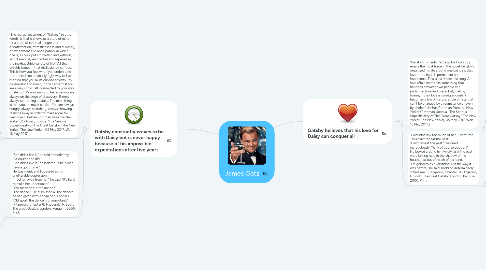
1. Gatsby constantly craves to be with Daisy but is never happy because of his impossible expectations after five years
1.1. "The real achievement of “Gatsby,” in other words, is that it shows us a state of mind. It’s a state of spiritual hunger and dissatisfaction, of restlessness and curiosity, of excitement and anticipation, in which one is, as Nick puts it, “within and without, simultaneously enchanted and repelled by the inexhaustible variety of life.” All this unfolds beneath that disillusioned surface. This is how you feel when you understand that there is no obviously right way to live, but find that you must choose anyway. It’s pessimistic and ironic, in the sense that you are always only half-committed to your way of life. But it’s also exciting, because you are always on the edge of discovery. There’s always something at stake. The main thing is that you are never settled. You are always hungry, always searching, always throwing feelings away in order to make room for new ones." Joshua Rothman from the New Yorker (Rothman, Joshua. "The Serious Superficiality of The Great Gatsby." The New Yorker. The New Yorker, 05 May 2017. Web. 16 May 2017.)
1.1.1. Rothman is describing a state of mind that the Great Gatsby puts you in of unending hunger for new experiences and new people, and Gatsby displays this sort of desire towards Daisy where he wants to do everything with her. Yet even though he succeeds in reigniting his relationship with Daisy he always only seems half interested in everything that he does without her and everything he does with her he feels is wrong because she doesn't live up to his impossible expectations that he's built up over five years, even if he doesn't know it. The things he's imagining will never come true because those were dreams fueled by nostalgia and the future he imagines is impossible.
1.2. “She didn’t like it,” he said immediately. “Of course she did.” “She didn’t like it,” he insisted. “She didn’t have a good time.” He was silent, and I guessed at his unutterable depression. “I feel far away from her,” he said. “It’s hard to make her understand.” “You mean about the dance?” “The dance?” He dismissed all the dances he had given with a snap of his fingers. “Old sport, the dance is unimportant.” (Fitzgerald, chapter 6) Fitzgerald, F. Scott. The great Gatsby. London: Penguin , 2000. Print.
1.2.1. This conversation takes place after a dance that Gatsby invited Tom, Nick, and most importantly Daisy to. This shows how Gatsby feels that Daisy didn't like the dance, in spite of the fact that Daisy was clearly having a good time throughout the chapter, Gatsby feels this way because it wasn't as good of a time as he expected it to be as he's been building up tremendous expectations over the last five years that can't be reached which is leading him to not have any fun and then believe that she feels the same. Gatsby is once again trying to relive the past and to an extent he's succeeding, but he's blinded by nostalgia so he thinks that everything he's experiencing right now isn't nearly as good as his past experiences with Daisy. So he continues to try and recreate the past instead of enjoying everything that he's got.
2. Gatsby believes that his love for Daisy can conquer all
2.1. "Gatsby’s romantic fantasy, his love story, exerts the most force in the novel. Gatsby’s organized his life around one big idea: that love, at its best, is permanent and impersonal. This is his dream, his song. A love affair seems like something that happens between two people at a particular time and place, but, Gatsby hopes, if their love is strong enough, it becomes a law of nature, a rule of fate that can’t be changed by circumstance or even by choice." Joshua Rothman from the New Yorker (Rothman, Joshua. "The Serious Superficiality of The Great Gatsby." The New Yorker. The New Yorker, 05 May 2017. Web. 16 May 2017.)
2.1.1. Rothman is making the point that Gatsby and Daisy's love is the strongest force in the story and that he believes that his and Daisy's love for each other will persist no matter how long they've been apart, Gatsby hopes his love will transcend time itself.
2.2. “I wouldn’t ask too much of her,” I ventured. “You can’t repeat the past.” “Can’t repeat the past?” he cried incredulously. “Why of course you can!” He looked around him wildly, as if the past were lurking here in the shadow of his house, just out of reach of his hand. “I’m going to fix everything just the way it was before,” he said, nodding determinedly. “She’ll see.” (Fitzgerald, Chapter 6) Fitzgerald, F. Scott. The great Gatsby. London: Penguin , 2000. Print.
2.2.1. Gatsby is telling Nick that he'll somehow undo everything done in the last five years, that he'll fix things with Daisy and make them just like they were before they were split apart which is impossible but Gatsby doesn't think so since Daisy is everything to him.

